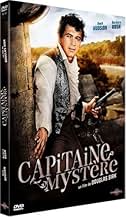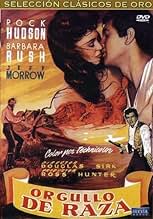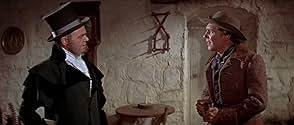VALUTAZIONE IMDb
6,1/10
945
LA TUA VALUTAZIONE
Una coppia di ribelli irlandesi vive avventure spericolate nel 1815.Una coppia di ribelli irlandesi vive avventure spericolate nel 1815.Una coppia di ribelli irlandesi vive avventure spericolate nel 1815.
Charles B. Fitzsimons
- Dan Shanley
- (as Charles FitzSimons)
Kenneth MacDonald
- Desmond (High Steward)
- (as Kenneth Mac Donald)
J.G. Devlin
- Tuer O'Brien
- (as James Devlin)
Recensioni in evidenza
While Douglas Sirk won't be everybody's cup of tea, which was as true then as to now, he was an interesting director. Perhaps best known for the last of his three primary periods which consisted namely of melodramas, that were always very well made and mostly well acted too but were either intense and moving or pure soap and unintentional camp. Another main reason for seeing 'Captain Lightfoot' was for one of his main lead actors Rock Hudson, who gave some of his best work under Sirk (with him being one of not many directors to fully understand Hudson's strengths).
'Captain Lightfoot', made when Sirk was nearing the end of his middle period, is not among the best films of either of them or one of the best of its genre. Sirk did better with especially 'Imitation of Life' and 'All That Heaven Allows'. As far as his filmography goes 'Captain Lightfoot' is around middle of the pack level. Hudson though comes off better and one can see why he was a popular leading man at the time and in Sirk's, who again really knew what to do with him and what he particularly excelled in, films.
Hudson is an immensely likeable lead, with such an endearing good nature and the charm and charisma factors are there. Barbara Rush is alluring and not too sugary, her chemistry with Hudson is sensitively charming and even if it is very cliched it didn't feel too rushed. Jeff Morrow is even better than the two of them, his performance brimming with authority. The supporting cast are not exceptional but are sturdy enough. Sirk's direction has skill and has some energy.
The film looks great, being very lavishly produced and the photography is very sumptuous. The music has the right amount of heroism, sensitivity and edge. Enough of the writing amuses and charms and the story likewise in parts.
At other points though, the story seemed a little uneventful and could have done with more oomph pace-wise. With the pacing sometimes being rather dull and not containing enough excitement. The script would have been better than it turned out if time constraints were kinder to it, there was a rushedly-written feel to it and with not enough time to give any depth to the characters or what goes on. Which all felt underdeveloped, with some vague politics, and some real credulity straining.
Sirk's direction has moments but he didn't seem in full command of the story, some of it came over as routine.
Overall, worth the look but not great. 6/10
'Captain Lightfoot', made when Sirk was nearing the end of his middle period, is not among the best films of either of them or one of the best of its genre. Sirk did better with especially 'Imitation of Life' and 'All That Heaven Allows'. As far as his filmography goes 'Captain Lightfoot' is around middle of the pack level. Hudson though comes off better and one can see why he was a popular leading man at the time and in Sirk's, who again really knew what to do with him and what he particularly excelled in, films.
Hudson is an immensely likeable lead, with such an endearing good nature and the charm and charisma factors are there. Barbara Rush is alluring and not too sugary, her chemistry with Hudson is sensitively charming and even if it is very cliched it didn't feel too rushed. Jeff Morrow is even better than the two of them, his performance brimming with authority. The supporting cast are not exceptional but are sturdy enough. Sirk's direction has skill and has some energy.
The film looks great, being very lavishly produced and the photography is very sumptuous. The music has the right amount of heroism, sensitivity and edge. Enough of the writing amuses and charms and the story likewise in parts.
At other points though, the story seemed a little uneventful and could have done with more oomph pace-wise. With the pacing sometimes being rather dull and not containing enough excitement. The script would have been better than it turned out if time constraints were kinder to it, there was a rushedly-written feel to it and with not enough time to give any depth to the characters or what goes on. Which all felt underdeveloped, with some vague politics, and some real credulity straining.
Sirk's direction has moments but he didn't seem in full command of the story, some of it came over as routine.
Overall, worth the look but not great. 6/10
Very unusual for a 1950's Universal costume adventure, Captain Lightfoot sports expensive, elaborate production values. It benefits greatly from extensive location shooting, beautifully photographed, and fancifully but tastefully colorful sets and costumes.
Hudson and Rush are excellent as dashing hero and his spitfire lady.
There's an effective mix of action, romantic comedy, and melodrama--all well staged.
Too bad the script is weak; often the character relationships and decisions characters make stretch credibility to the point of distraction.
Contrary to what a couple of other reviewers here said, I thought most of the supporting cast so-so, Abby Players or not. None of the fun, charisma, and panache that British-Hollywood baddies like Basil Rathbone, Claude Raines, and Henry Daniel brought to similar material.
Hudson and Rush are excellent as dashing hero and his spitfire lady.
There's an effective mix of action, romantic comedy, and melodrama--all well staged.
Too bad the script is weak; often the character relationships and decisions characters make stretch credibility to the point of distraction.
Contrary to what a couple of other reviewers here said, I thought most of the supporting cast so-so, Abby Players or not. None of the fun, charisma, and panache that British-Hollywood baddies like Basil Rathbone, Claude Raines, and Henry Daniel brought to similar material.
Universal in the early Fifties was a decidedly second rate studio in desperate need of a star of their own. Director Douglas Sirk spotted Rock Hudson in a bit role and sensed star potential. Sirk almost single handedly coached and groomed Hudson towards stardom, which was achieved with the wildly successful "Magnificent Obsession" (1954). They would make eight movies together, "Captain Lightfoot" being the fourth, and the first in which Hudson would appear as an established star.
Hudson's newfound stardom is palpable throughout the movie. He exudes a boyish confidence as yet unseen in his work making this the joyful romp that Sirk intended. He is matched by a feisty Barbara Rush who played opposite him in the inferior "Taza, Son of Cochise" and supported by an cast of Irish players vastly superior to the bit players Universal would have supplied had the movie not been shot in Ireland.
Sirk's Hollywood career can be divided into three phases. First, the early years in a new country, finding his feet with some solid, if unexciting movies. The middle period was characterized by light weight comedies and trying his hand at different genres such as the western, the costume and historical dramas. Finally, would be his golden period of the melodramas for which he became famous. "Captain Lightfoot" signals the end of the middle period.
While extremely enjoyable, it lacks sufficient substance to make it memorable. Sirk fans would naturally not want to miss this, but Rock Hudson fans in particular should seek this out. He seldom seemed to be truly having such a good time as here when flexing his new grown wings of stardom.
Hudson's newfound stardom is palpable throughout the movie. He exudes a boyish confidence as yet unseen in his work making this the joyful romp that Sirk intended. He is matched by a feisty Barbara Rush who played opposite him in the inferior "Taza, Son of Cochise" and supported by an cast of Irish players vastly superior to the bit players Universal would have supplied had the movie not been shot in Ireland.
Sirk's Hollywood career can be divided into three phases. First, the early years in a new country, finding his feet with some solid, if unexciting movies. The middle period was characterized by light weight comedies and trying his hand at different genres such as the western, the costume and historical dramas. Finally, would be his golden period of the melodramas for which he became famous. "Captain Lightfoot" signals the end of the middle period.
While extremely enjoyable, it lacks sufficient substance to make it memorable. Sirk fans would naturally not want to miss this, but Rock Hudson fans in particular should seek this out. He seldom seemed to be truly having such a good time as here when flexing his new grown wings of stardom.
A colorful, light adventure that plays like a classic swashbuckler, the Ross Hunter production "Captain Lightfoot," is entertaining Hollywood hokum from a screenplay by W.R. Burnett and Oscar Brodney, which was loosely based on Irish history. The casting of Rock Hudson as Mike Martin, aka Captain Lightfood, undercuts any pretense to historical accuracy, despite a supporting cast of Irish players. Although hired more for his looks and marquee value, than his aptness for the role, Hudson nevertheless is amiable, and he attempts a slight brogue that gets slighter as the film progresses. While his good-natured performance is an asset to the movie, Hudson lacks the confidence and bravado that a Burt Lancaster would have brought to the part.
Martin was a bold highwayman in early 19th century Ireland, who worked for a revolutionary society in support of Irish independence. An Irish Robin Hood, Martin stole from the English oppressors to aid the cause and to feed the poor. An Irish rebel patriot, Captain John Doherty, hears of Martin's exploits and enlists him to be his second in command; brought to Dublin by Doherty, Martin is dubbed Captain Lightfoot by Doherty's saucy headstrong daughter, Aga, after a fumbled dance with him. Known as Captain Thunderbolt, Doherty runs a gambling establishment that fleeces the English to fund the independence struggle. Like a boys' adventure movie, "Captain Lightfoot" is often exciting fun. During duels and escapes, fights and chases, robberies and romance, director Douglas Sirk maintains a steady pace.
Barbara Rush provides the requisite love interest as Aga, although the predictable romance between her and Hudson is of the clichéd "hate at first sight" variety, and viewers know the outcome from the first scene. Jeff Morrow, who plays Aga's father, Doherty, arguably gives the film's best performance; he is strong, authoritative, and convincing as a rebel leader. "Captain Lightfoot's" technical credits are also good. Shot on location in Ireland, the scenery is lush and beautiful, and the music, supervised by Joseph Gershenson, is rousing. While undemanding fun, the movie does not rise to memorable, despite the presence of a young Rock Hudson at the cusp of stardom. For Hudson fans, the film is essential viewing, for others, light escapist fun.
Martin was a bold highwayman in early 19th century Ireland, who worked for a revolutionary society in support of Irish independence. An Irish Robin Hood, Martin stole from the English oppressors to aid the cause and to feed the poor. An Irish rebel patriot, Captain John Doherty, hears of Martin's exploits and enlists him to be his second in command; brought to Dublin by Doherty, Martin is dubbed Captain Lightfoot by Doherty's saucy headstrong daughter, Aga, after a fumbled dance with him. Known as Captain Thunderbolt, Doherty runs a gambling establishment that fleeces the English to fund the independence struggle. Like a boys' adventure movie, "Captain Lightfoot" is often exciting fun. During duels and escapes, fights and chases, robberies and romance, director Douglas Sirk maintains a steady pace.
Barbara Rush provides the requisite love interest as Aga, although the predictable romance between her and Hudson is of the clichéd "hate at first sight" variety, and viewers know the outcome from the first scene. Jeff Morrow, who plays Aga's father, Doherty, arguably gives the film's best performance; he is strong, authoritative, and convincing as a rebel leader. "Captain Lightfoot's" technical credits are also good. Shot on location in Ireland, the scenery is lush and beautiful, and the music, supervised by Joseph Gershenson, is rousing. While undemanding fun, the movie does not rise to memorable, despite the presence of a young Rock Hudson at the cusp of stardom. For Hudson fans, the film is essential viewing, for others, light escapist fun.
Rock Hudson, Barbara Rush, and Jeff Morrow came over from America to appear with a cast of Irish players starring in Captain Lightfoot. It's a story of Ireland in the post Napoleonic era with the dashing Captain Thunderbolt looking for a successor to carry on with banditry and villainy all in the cause of a free Ireland.
Morrow is the legendary Thunderbolt getting on in years and when in the guise of a parson spots young Rock Hudson taking on a British dragoon. That was it, Morrow has found his man.
He also finds his son-in-law as well as his daughter Barbara Rush eventually falls for Hudson who after a period where she thinks of him as a country bumpkin, starts falling for him. She names his Lightfoot because of lack of ability on the dance floor. There relationship is not approved of by Morrow and first and Rush is a spitfire. There's a lot of borrowing from The Taming Of The Shrew here.
Hudson seems a bit ill at ease in a part that a young Errol Flynn would have gone to town with. Also if you've seen Douglas Fairbanks, Jr. in The Fighting O'Flynn with that kind of élan Fairbanks brought to the part it was a shame he was about 15 years too old for the role.
Rush and Morrow are great and the Irish locations and the talents of the supporting cast, many of them members of the Abbey Theater really do make the film a visual treat and a treat for the ears. The finale involving storming the castle at Ballymoor is well staged.
He wasn't well cast, but the role did no harm to the rising career of Rock Hudson.
Morrow is the legendary Thunderbolt getting on in years and when in the guise of a parson spots young Rock Hudson taking on a British dragoon. That was it, Morrow has found his man.
He also finds his son-in-law as well as his daughter Barbara Rush eventually falls for Hudson who after a period where she thinks of him as a country bumpkin, starts falling for him. She names his Lightfoot because of lack of ability on the dance floor. There relationship is not approved of by Morrow and first and Rush is a spitfire. There's a lot of borrowing from The Taming Of The Shrew here.
Hudson seems a bit ill at ease in a part that a young Errol Flynn would have gone to town with. Also if you've seen Douglas Fairbanks, Jr. in The Fighting O'Flynn with that kind of élan Fairbanks brought to the part it was a shame he was about 15 years too old for the role.
Rush and Morrow are great and the Irish locations and the talents of the supporting cast, many of them members of the Abbey Theater really do make the film a visual treat and a treat for the ears. The finale involving storming the castle at Ballymoor is well staged.
He wasn't well cast, but the role did no harm to the rising career of Rock Hudson.
Lo sapevi?
- QuizInspired Michael Cimino to write Una calibro 20 per lo specialista (1974).
- ConnessioniFeatured in Behind the Mirror: A Profile of Douglas Sirk (1979)
I più visti
Accedi per valutare e creare un elenco di titoli salvati per ottenere consigli personalizzati
- How long is Captain Lightfoot?Powered by Alexa
Dettagli
Botteghino
- Lordo Stati Uniti e Canada
- 1.300.000 USD
- Tempo di esecuzione
- 1h 32min(92 min)
- Colore
- Proporzioni
- 2.55 : 1
Contribuisci a questa pagina
Suggerisci una modifica o aggiungi i contenuti mancanti

















